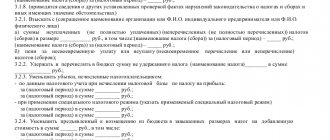Certificate of completion of verification
On the last day of the on-site tax audit, the head of the inspection team draws up a certificate in the form approved by Order of the Federal Tax Service of Russia dated May 31, 2007 No. MM-3-06/338 (clause 15 of Article 89 of the Tax Code of the Russian Federation).
The certificate must indicate:
- place and date of compilation;
- details of the decision to schedule an on-site inspection;
- full and abbreviated name of the organization in which the inspection was carried out, its tax identification number and checkpoint;
- subject of the audit (types of taxes being audited, the period covered by the audit);
- period of inspection.
If the inspection was carried out at a member of the consolidated group, then the certificate also indicates:
- TIN, KPP of a consolidated group of taxpayers with the date and registration number of the agreement on its creation;
- full and abbreviated name of the responsible participant in the consolidated group of taxpayers, his INN, KPP;
- full and abbreviated names of other participants in the consolidated group of taxpayers, their Taxpayer Identification Number (TIN) and KPP.
This follows from paragraph 11 of Article 89 of the Tax Code of the Russian Federation and Appendix 2 to the order of the Federal Tax Service of Russia dated May 31, 2007 No. MM-3-06/338.
The preparation of a certificate indicates the completion of the inspection (clause 8 of Article 89 of the Tax Code of the Russian Federation). From the date of preparation of the certificate, the deadlines for further processing of the results of the tax audit begin. After drawing up the certificate, representatives of the tax inspectorate do not have the right to be on the territory of the organization, request documents or carry out any tax control activities. Such clarifications are contained in paragraph 3 of the letter of the Federal Tax Service of Russia dated December 29, 2012 No. AS-4-2/22690.
How to fill it out correctly
The template for a certificate of an on-site tax audit carried out in an organization is filled out using a simple algorithm. You need to enter specific information in the appropriate fields. The text is written by hand. You can use a pen with black or blue ink. The use of other colors is unacceptable. It is also allowed to fill out the form on the computer. Rules for filling out the form:
- Enter the address and date of compilation.
- Indicate the name of the federal agency responsible for the inspection.
- Indicate your full name. head of the inspection.
- Indicate the name and details of the verified company. If we are talking about an individual entrepreneur, write down his full name.
- List taxes and fees assigned as a result of the event.
- Specify the payment period.
- Write the start and end date of the control.
The completed sheet of the certificate about the on-site tax audit carried out in the organization is signed by an authorized person, whose role is the head of the inspection. The legal paper is then affixed with a company seal.
The director of the audited company has the right to send a request to the manager. It also provides evidence of activities carried out in the company. The results of the check are also recorded there.
Presentation of certificate
Inspectors must hand over the certificate of the inspection to the legal or authorized representative of the organization on the day of preparation (i.e., on the last day of the inspection) (paragraph 1, clause 15, article 89 of the Tax Code of the Russian Federation). In this case, the authorized representative must have a power of attorney to represent the interests of the organization in the tax inspectorates.
The certificate form provides a field in which the representative of the organization must mark the receipt of the certificate. If a representative of an organization avoids receiving a certificate, the inspection will send it to the organization by registered mail (paragraph 2, clause 15, article 89 of the Tax Code of the Russian Federation). In this case, the date of receipt of the certificate will be considered the date indicated on the calendar stamp imprint of the postal notification of delivery of the letter (clause 3 of the letter of the Federal Tax Service of Russia dated December 29, 2012 No. AS-4-2/22690).
In addition, the certificate can be transmitted to the organization via telecommunication channels. The procedure for electronic document flow between tax inspectorates and taxpayers was approved by Order of the Federal Tax Service of Russia dated April 15, 2015 No. ММВ-7-2/149. An electronic certificate will be considered received when the inspection receives an electronic receipt for the receipt of this document. If the inspection does not receive such a receipt, it will send a certificate on paper in accordance with the generally established procedure. This conclusion follows from the provisions of paragraphs 12, 16 and 19 of the Procedure, approved by order of the Federal Tax Service of Russia dated April 15, 2015 No. ММВ-7-2/149.
Situation: can the inspection, instead of the original, give the organization a copy of the certificate of the on-site inspection?
Answer: yes, it can.
On the last day of the on-site tax audit, the head of the inspection team draws up a certificate and hands it to the organization’s representative. This procedure is provided for in paragraph 15 of Article 89 of the Tax Code of the Russian Federation. The provisions of this norm do not determine in what form (original or copy) the certificate must be transferred to the organization. Therefore, the inspection has the right to give the organization a copy of the certificate and keep the original. In arbitration practice there are examples of court decisions that confirm the legitimacy of this conclusion (see, for example, the decision of the Seventh Arbitration Court of Appeal dated November 10, 2008 No. 07AP-6276/08).
Situation: is it possible to cancel a decision based on the results of an on-site inspection if the inspection did not provide the organization with a certificate of inspection?
Answer: no, you can't.
The decision based on the results of a tax audit is subject to cancellation if the inspection violates the essential conditions of the procedure for considering audit materials. In particular, such a decision is canceled if the inspection does not provide the organization with the opportunity to participate in the consideration of the inspection materials and provide explanations on them. This is stated in paragraph 2 of paragraph 14 of Article 101 of the Tax Code of the Russian Federation. In addition, other violations related to the procedure for reviewing materials that could lead to the adoption of an incorrect decision (paragraph 3, paragraph 14, article 101 of the Tax Code of the Russian Federation) may become grounds for canceling the inspection decision.
The fact that the inspection did not transfer the certificate to the organization does not affect the procedure for considering tax audit materials. Consequently, such a violation in itself cannot become a basis for canceling the decision based on the results of the on-site inspection. In arbitration practice there are examples of court decisions that confirm the legitimacy of such a conclusion (see, for example, the resolution of the Ninth Arbitration Court of Appeal dated October 16, 2008 No. 09AP-11298/2008-AK).
General information
First, let's figure out what the tax police are for the activities of companies. Why is it needed? What types are there? From the point of view of organizing the process, inspections are usually divided into two types:
- A planned feature is that the head of the company is warned in advance about the inspection. A written notification is sent by mail.
- Sudden - such a check is carried out without warning. It is carried out in cases where there are suspicions about the integrity of the company. The director does not know about the planned arrival of specialists.
Regardless of the type of event, tax service employees draw up a document confirming the on-site tax audit carried out in the organization. In it, employees record the results of the control performed.
What goals are pursued by employees of the federal service:
- enforce laws regarding the payment of fees and taxes;
- check whether the necessary calculations are carried out correctly;
- collect penalties, arrears, fines;
- bring the perpetrators to administrative or criminal liability;
- stop the commission of a legal violation.
The inspection comes to both companies and individual entrepreneurs. Set of actions:
- verification of the correctness of maintaining cash documents;
- inspection of premises;
- carrying out inventory.
At the request of employees of the federal body, the director of the company is obliged to present all requested legal and accounting papers. The deadline for presentation is 5 days. Refusal may result in criminal or administrative liability. The federal service has the right to seize the documents they need without the consent of the head of the company.
Checking act
No later than two months from the date of registration of the certificate, the inspectors draw up an on-site tax audit report (paragraph 1, clause 1, article 100 of the Tax Code of the Russian Federation). Its form was approved by order of the Federal Tax Service of Russia dated December 25, 2006 No. SAE-3-06/892. Inspectors must draw up an act, even if the results of the inspection did not reveal any violations (paragraph 1, paragraph 1, article 100 of the Tax Code of the Russian Federation, letter of the Federal Tax Service of Russia dated April 16, 2009 No. ШТ-22-2/299). In this case, the inspectors indicate in the report that there are no violations of tax legislation (subclause 12, clause 3, article 100 of the Tax Code of the Russian Federation).
Tax legislation establishes clear requirements for the execution of an on-site inspection report (clauses 3, 3.1, 4 of Article 100 of the Tax Code of the Russian Federation, Requirements approved by order of the Federal Tax Service of Russia dated December 25, 2006 No. SAE-3-06/892). For more information about what information inspectors must include in the inspection report, see the table.
If, when preparing an inspection report, the inspectorate has doubts about the interpretation of the legislation, the draft act can be sent for preliminary approval to the regional tax department. For example, this is possible if there are no official explanations from the Federal Tax Service of Russia on some issues or if these explanations do not coincide with the position of the Ministry of Finance of Russia. The deadlines for approval of draft inspection reports are set by the regional Federal Tax Service. However, these deadlines should not increase the total duration of preparation of the act (two months) established by paragraph 1 of paragraph 1 of Article 100 of the Tax Code of the Russian Federation. This follows from the provisions of Section II of the Procedure, approved by Order of the Federal Tax Service of Russia dated October 17, 2013 No. ММВ-7-3/449.
Situation: is it possible to cancel the inspection decision made based on the results of an on-site inspection? The inspection drew up an on-site inspection report containing violations (errors).
It is possible if violations committed during the preparation of the report led to the adoption of an incorrect decision based on the results of the on-site inspection.
The decision on a tax audit is subject to cancellation if the inspection violates the essential conditions of the procedure for considering audit materials. Thus, the inspection decision is canceled if the inspection does not provide the organization with the opportunity to participate in the consideration of the inspection materials and provide explanations on them. This is stated in paragraph 2 of paragraph 14 of Article 101 of the Tax Code of the Russian Federation. In addition, other violations related to the procedure for reviewing materials that could lead to the adoption of an incorrect decision (paragraph 3, paragraph 14, article 101 of the Tax Code of the Russian Federation) may become grounds for canceling the inspection decision.
The on-site audit report is one of the main materials of the tax audit, after consideration of which the inspectorate makes a final decision based on the results of the audit (clause 1 of Article 101 of the Tax Code of the Russian Federation). Consequently, violations committed by the inspectorate when drawing up the report may become the basis for making an incorrect decision based on the results of the on-site inspection. In this case, the inspection decision is subject to cancellation in full or in part related to the violation. In arbitration practice, there are court decisions that confirm the legitimacy of this conclusion. Thus, the inspection decision made based on the results of an on-site inspection can be canceled (in whole or in part) if the inspection made the following violations (errors) when drawing up the report:
- incorrectly applied the legislation and made incorrect conclusions, which were reflected in the final decision (see, for example, the decision of the Supreme Arbitration Court of the Russian Federation dated October 6, 2009 No. VAS-12395/09, resolution of the Federal Antimonopoly Service of the West Siberian District dated June 3, 2009 No. F04-3218/2009(7668-A46-26), F04-3218/2009(8926-A46-26), Moscow District dated September 29, 2009 No. KA-A40/6946-09);
- distorted the facts established during the audit (see, for example, resolution of the Federal Antimonopoly Service of the Ural District dated November 25, 2009 No. F09-9205/09-S2);
- assessed additional taxes, penalties and fines for periods that could not be covered by the on-site inspection (see, for example, the resolution of the Federal Antimonopoly Service of the Far Eastern District dated February 20, 2008 No. F03-A73/08-2/126);
- did not substantiate the fact of a tax offense and held the organization accountable for committing it (see, for example, the determination of the Supreme Arbitration Court of the Russian Federation dated June 4, 2009 No. VAS-6861/09, resolution of the Federal Antimonopoly Service of the East Siberian District dated February 10, 2009 No. A33- 6906/07-F02-15/09, Central District dated January 21, 2010 No. A35-1157/08-C15, dated November 30, 2009 No. A64-3933/07-16, Volga-Vyatka District dated December 21, 2009 No. A82-9362/2008, Volga District dated November 24, 2009 No. A72-2919/2009, West Siberian District dated September 9, 2009 No. F04-5332/2009(18985-A03-34), Moscow District dated April 6, 2009 No. KA-A40/2403-09, dated January 20, 2009 No. KA-A40/11945-08, Northwestern District dated May 4, 2009 No. A56-13415/2006, Ural District dated August 28, 2008 No. Ф09-6143/08-С3).
As a general rule, the on-site tax audit report is drawn up in two copies: one for the inspection, the second for the organization. When conducting a joint tax audit, the act is drawn up in three copies: the third copy is transferred by the inspectorate to the internal affairs bodies. When conducting a repeated on-site inspection in order to monitor the activities of a lower inspection, the report is also drawn up in triplicate. In this case, the higher tax authority that conducted the audit will send the third copy of the report to the inspectorate. This is stated in paragraph 9 of the Requirements approved by order of the Federal Tax Service of Russia dated December 25, 2006 No. SAE-3-06/892.
In what order should an inspection report be prepared and drawn up?
The on-site tax audit report is drawn up as a final document reflecting information about all the collected evidence of the taxpayer’s guilt and the amount of arrears or the absence of violations, if they were not discovered by the inspectors.
This differs from a desk audit report, which is drawn up only when inconsistencies are detected (see the article Drawing up a desk tax audit report). The procedure for processing the results of an on-site tax audit (hereinafter referred to as the VNP) is regulated by:
- Tax Code of the Russian Federation (Article 100);
- letter of the Federal Tax Service of the Russian Federation “On recommendations for conducting GNP” dated July 25, 2013 No. AS-4-2/13622 (Chapter 6);
- by order of the Federal Tax Service of the Russian Federation “On approval of document forms...” dated 05/08/2015 No. ММВ-7-2/ [email protected] (Appendices 7, 23, 24);
- letter of the Federal Tax Service of the Russian Federation “Recommendations on the procedure for organizing the work of tax authorities” dated 08/07/2013 No. SA-4-9/ [email protected] and other regulatory acts.
The GNP act is drawn up strictly in accordance with the approved form (clause 1 of Article 100 of the Tax Code of the Russian Federation) in writing and cannot contain clerical errors or corrections that are not confirmed by the signatures of the inspectors. All copies must be identical in content. The on-site tax audit report must be prepared no later than 2 months from the date of drawing up the certificate of completion of the GNP.
IMPORTANT! An act based on the results of the VNP is drawn up even if control measures do not reveal any violations in the activities of the taxpayer (clause 1 of Article 100 of the Tax Code of the Russian Federation).
Delivery of the act
The inspection must give the organization its copy of the act within five working days from the date of signing the act (clause 5 of article 100, clause 6 of article 6.1 of the Tax Code of the Russian Federation).
The inspection can hand over the act:
- personally to the legal or authorized representative of the organization against signature. In this case, the authorized representative must have a power of attorney to represent the interests of the organization in the tax inspectorates;
- in another way indicating the date of receipt of the act by the organization (for example, through a courier service).
This follows from paragraph 5 of Article 100 of the Tax Code of the Russian Federation.
Upon receipt of the act, the representative of the organization must put two signatures on it:
- on receipt of the act (clause 5 of article 100 of the Tax Code of the Russian Federation);
- about familiarization with the contents of the act. If a representative of the organization refuses to sign the act (for example, due to his incompetence), then the corresponding note about the refusal to sign will be made in the act (clause 2 of Article 100 of the Tax Code of the Russian Federation).
Situation: to whom is the tax audit report handed over: the head office of the organization or its branches? The on-site tax audit was carried out simultaneously in relation to the head office of the organization and its branches.
When simultaneously inspecting the head office of an organization and its branches, the head office of the organization receives an on-site tax audit report.
Within five working days from the date of drawing up, the tax audit report must be sent to the organization in respect of which the audit was carried out, or handed over to its representative (clause 5 of Article 100 of the Tax Code of the Russian Federation). The document is drawn up in accordance with the order of the Federal Tax Service of Russia dated December 25, 2006 No. SAE-3-06/892.
The results of the branch inspection are documented by filling out the relevant sections of the single inspection report. After reading them, the relevant section of the act is signed by the head of the branch. This is stated in the Requirements approved by order of the Federal Tax Service of Russia dated December 25, 2006 No. SAE-3-06/892. At the same time, the order of the Federal Tax Service of Russia dated December 25, 2006 No. SAE-3-06/892 does not provide for the delivery of individual parts of the act (sections) to the branch of the organization. Therefore, a single inspection report is handed over to a representative of the organization’s head office (sent to the organization).
At the same time, the head office of the organization has the right to send to its branches extracts from the inspection report (copies of sections of the report) relating to its branches.
Similar explanations are contained in letters of the Ministry of Finance of Russia dated September 10, 2007 No. 03-02-07/1-406, Federal Tax Service of Russia dated March 19, 2007 No. CHD-6-23/216.
What to pay attention to
The form of a certificate of an on-site tax audit carried out in an organization can only be drawn up by federal employees. It is prohibited to prepare the document yourself.
Other prohibitions that apply to the specified certificate:
- entering false information;
- writing text with grammatical or punctuation errors;
- making corrections to existing text;
- crossing out content;
- affixing electronic digital signatures.
If the indicated rules are ignored, the document is considered void. It becomes invalid until the defects are corrected.
Sending the act by mail
If an organization (its representative) avoids receiving an on-site inspection report, the inspection reflects this fact in the report and sends it by registered mail to the location of the organization (separate unit). In this case, the date of receipt of the act is considered to be the sixth working day from the date of sending the registered letter. This follows from the provisions of paragraph 2 of paragraph 5 of Article 100 and paragraph 6 of Article 6.1 of the Tax Code of the Russian Federation. Moreover, the countdown of the six-day period begins from the day following the day of sending the act (clause 2 of article 6.1 of the Tax Code of the Russian Federation).
Situation: does the inspection have the right to transfer a tax audit report (desk, field) by registered mail (by mail), if the organization does not evade receiving it?
The inspectorate may send a tax audit report by registered mail. But the date of its receipt will be considered the sixth working day from the date of sending the registered letter only if the organization evaded receiving the act. If the organization did not evade receiving the act, then the day of its delivery should be considered the day the organization actually received the registered letter.
This conclusion follows based on the totality of the following norms.
Tax legislation indicates that the inspectorate has the right to transfer a tax audit report in person against a signature or in other ways indicating the date of receipt of the report by the organization. This is stated in paragraph 1 of paragraph 5 of Article 100 of the Tax Code of the Russian Federation. Consequently, sending the act by registered mail is not a violation of the law on the part of the inspectorate, since this method of transmission allows one to reliably determine the date of actual receipt of the act by the organization.
At the same time, the legislation specifies that the inspectorate has the right to send a tax audit report by registered mail only if the organization avoids receiving it. In this case, the date of receipt of the act by the organization is considered to be the sixth working day from the date of sending the registered letter. This follows from the provisions of paragraph 2 of paragraph 5 of Article 100 and paragraph 6 of Article 6.1 of the Tax Code of the Russian Federation. Moreover, the countdown of the six-day period begins from the day following the day of sending the act (clause 2 of article 6.1 of the Tax Code of the Russian Federation).
The regulatory agencies did not express an official point of view on this matter. But in arbitration practice there are court decisions that confirm the legitimacy of this conclusion (see, for example, Resolution of the FAS of the Volga District dated December 17, 2009 No. A55-5813/2009).
Situation: to what address of the organization - legal or actual - should the inspection send a registered letter with a tax audit report (office, on-site)?
The inspectorate must send a registered letter with a tax audit report to the location of the organization, that is, to its legal address, which is indicated in the Unified State Register of Legal Entities (clause 5 of Article 31, clause 5 of Article 100 of the Tax Code of the Russian Federation). Similar explanations are contained in paragraph 1 of the letter of the Federal Tax Service of Russia dated September 20, 2013 No. AS-4-2/16981.
Situation: is the inspection obliged to attach to the report handed over to the organization evidence of violations that were identified during a tax audit (on-site, office)?
If documents received from the organization being inspected serve as evidence of a violation, then the inspectorate is not obliged to attach such evidence to the inspection report.
In this case, the following features must be taken into account.
If evidence of a violation is provided by documents received from other sources (for example, documents from counterparties, protocols for interviewing witnesses), then the inspectorate must attach such evidence to the tax audit report. This obligation remains even if information received from third parties:
- constitute a banking, tax or other secret protected by law (for example, commercial);
- contain personal data of citizens.
In these cases, not complete copies of documents, but extracts from them certified by the inspectorate should be attached to the tax audit report.
This procedure is established by paragraph 3.1 of Article 100 of the Tax Code of the Russian Federation, paragraph 1.13 of Appendix 6 to the order of the Federal Tax Service of Russia dated December 25, 2006 No. SAE-3-06/892.
Consequences of violating the procedure for drawing up an act
In accordance with paragraph 4 of Art. 100 of the Tax Code of the Russian Federation, the requirements for the form and procedure for drawing up the act are established by order No. ММВ-7-2/ [email protected] As indicated by the FAS VSO in its resolution dated 03/05/2013 in case No. A19-9755/2012, the procedure for registering the results of the GNP consists of a systematic description in the act of documented facts of offenses. The person is given the right to file objections and participate in the consideration of documents collected during the inspection.
Violation of these provisions will result in the cancellation of decisions of the tax authority. For example, the courts will support the taxpayer if the act does not contain a description of the fact of the violation itself (decision of the Moscow Arbitration Court dated April 25, 2012 in case No. A40-523/11-20-3), or analysis of the discrepancy in amounts (resolution of the Federal Antimonopoly Service of the Central District dated April 19, 2013 in the case No. A09-1952/2012).
Decision on the act
Based on all available tax audit materials (on-site audit report; written objections from the organization, protocols, expert opinions, etc.), the inspectorate makes a final decision based on the results of the on-site audit (Clause 1, Article 101 of the Tax Code of the Russian Federation). The inspection must hand over the decision to a legal or authorized representative of the organization. In this case, the authorized representative must have a power of attorney to represent the interests of the organization in the tax inspectorates. For more information about the timing, procedure and rules for processing such a decision, see How a decision is made based on the results of a tax audit.
In a visual form, the stages of conducting an on-site inspection, the procedure for processing its results, the document flow diagram and options for actions of inspectors in various situations are presented in the letter of the Federal Tax Service of Russia dated December 15, 2011 No. AS-4-2/21396, which was sent to all tax inspectorates.
Sample certificate of on-site tax audit carried out in an organization
The following recommendations should be followed. Otherwise, the document will be declared invalid. It is important to familiarize yourself with the approved template not only for the compiler, but also for the person ordering the certificate. A sample certificate of an on-site tax audit of an organization is available below.
Actions of the taxpayer when registering the results of the GNP
The tax authority must familiarize the taxpayer with the results of the GNP, about which a corresponding note is made in the certificate and act. Along with the act, the person is given a notice of the time and place of consideration of the inspection materials (clause 7.4 of letter No. AS-4-2/13622).
IMPORTANT! If the Tax Inspectorate does not reveal any violations, the audit materials are not reviewed with the participation of the taxpayer.
Based on clause 6 of Art. 100 of the Tax Code of the Russian Federation, the inspected person has the right, within a month from the date of receipt of the act, to send his objections with copies of supporting documents to the inspectorate. The taxpayer has the right to petition the tax authority to postpone the consideration of the audit materials in order to provide additional evidence (clause 2 of letter No. CA-4-9/ [email protected] ).






